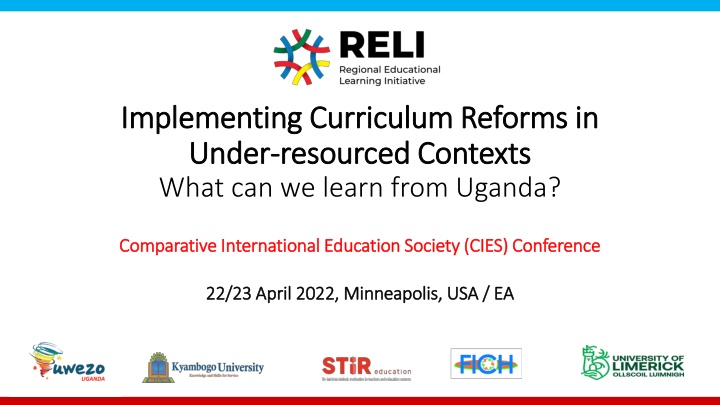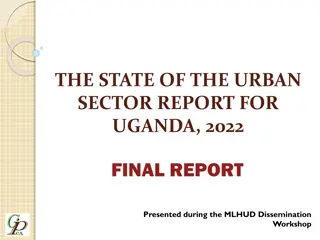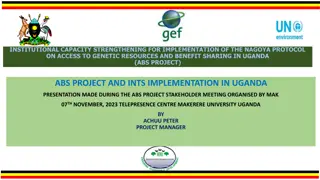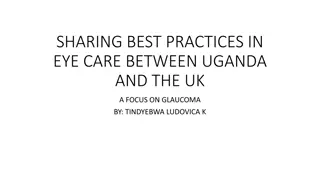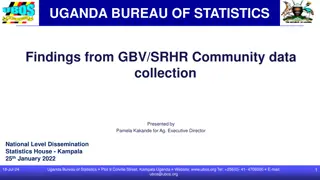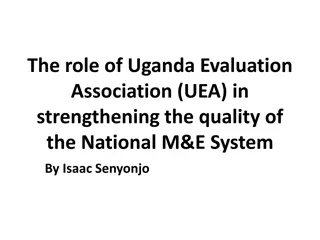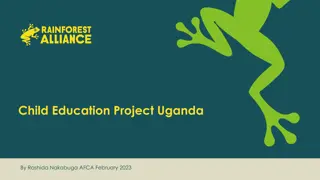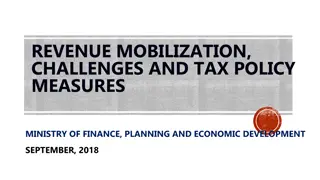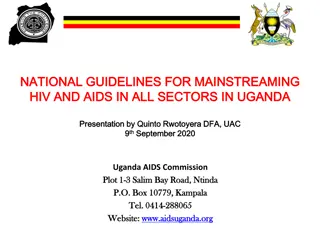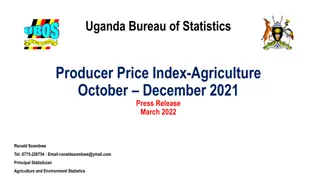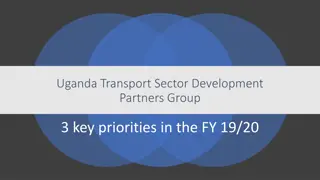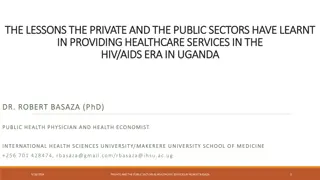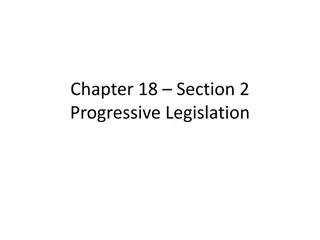Implementing Curriculum Reforms in Under-resourced Contexts: Lessons from Uganda
Explore how Uganda is implementing curriculum reforms in under-resourced contexts to address the quality of education and graduate employability. The discussion delves into the challenges faced in the Ugandan education system, the introduction of a competency-based lower secondary curriculum, and a recent study on teachers' experiences in implementing the new curriculum.
Download Presentation

Please find below an Image/Link to download the presentation.
The content on the website is provided AS IS for your information and personal use only. It may not be sold, licensed, or shared on other websites without obtaining consent from the author.If you encounter any issues during the download, it is possible that the publisher has removed the file from their server.
You are allowed to download the files provided on this website for personal or commercial use, subject to the condition that they are used lawfully. All files are the property of their respective owners.
The content on the website is provided AS IS for your information and personal use only. It may not be sold, licensed, or shared on other websites without obtaining consent from the author.
E N D
Presentation Transcript
Implementing Curriculum Reforms in Implementing Curriculum Reforms in Under Under- -resourced Contexts resourced Contexts What can we learn from Uganda? Comparative International Education Society (CIES) Conference Comparative International Education Society (CIES) Conference 22/23 April 2022, Minneapolis, USA / EA 22/23 April 2022, Minneapolis, USA / EA
Panelists and Discussant Mary Goretti Nakabugo Mary Goretti Nakabugo Dr Patrick Ojok Dr Patrick Ojok Emmy Zoomlamai Emmy Zoomlamai Prof Paul Conway Prof Paul Conway Jane Sebuyungo & Modern Jane Sebuyungo & Modern Karema Karema
Implementing Curriculum Reforms in Under Implementing Curriculum Reforms in Under- - resourced Contexts resourced Contexts The quality of an education [largely] depends on the quality of its curriculum. Lack of employable skills among graduates is usually blamed on the school curriculum
The Ugandan Context The Ugandan Context Uganda s education system has been criticised for being examination- ridden It has also been criticised for producing graduates who can hardly meet the market demand A labour market survey recommended a radical review of the secondary education curriculum (NCDC, 2021)
The Ugandan Context: Curriculum reform The Ugandan Context: Curriculum reform Comprehensive review and a new lower secondary curriculum introduced at the beginning of the 2020 school calendar. The new curriculum is competency-based, with a focus on generic skills and values A focus on Core Values, Key Learning Outcomes, Generic Skills, eight Learning Areas and five Cross-cutting issues.
Focus of the Panel Focus of the Panel Early this year, we undertook a study to understand how teachers have conceived and implemented the new curriculum. Driven by the need to take stock of progress made and teachers experiences, and generate lessons early enough.
The papers The papers Dr Patrick Dr Patrick Ojok s discusses selected findings on the teachers perceptions of preparedness to implement the new curriculum. Ojok s paper sets out the key curriculum intentions and expectations and Jane Sebuyungo Jane Sebuyungo and Modern in the implementation process and analyses the teachers interpretation of the new curriculum and how they have attempted to implement it and Modern Karema s Karema s paper examines the roles of different stakeholders Emmy Zoomlamai Emmy Zoomlamai and Mary Goretti Nakabugo s paper probes into how assessment in the new curriculum at classroom level has been implemented and discusses selected findings on how teachers have perceived the new assessment
The Role of Teachers in Curriculum Implementation
Introduction Introduction Implementing curriculum changes requires major structural changes to curricula and standards, but the key element in the success of the changes is having well trained and confident teachers (Thompson, Bell, Andreae, & Robins, 2013) Since teachers play a pivotal role in curriculum reforms, it is vital to pay adequate and timely attention to teacher factors such as training, commitment to teaching, attitudes towards the new curriculum, and teacher knowledge and understanding of the reform (Altinyelken, (2010).
Research Objective Research Objective Determine the perceived preparedness of lower secondary school teachers to implement the competency based lower secondary curriculum.
Methodology Methodology sample 12 districts 84 schools. Participants : N =499 (male 28%, female =72%) Survey of teachers and school administrators Key informant interviews
Teachers understanding, confidence and Teachers understanding, confidence and perceived competence perceived competence The majority (71.1%) of the teachers agreed (strongly agreed 13.8%; agreed 57.3%) they clearly understood the goals and objectives of the competency based Lower Secondary Curriculum (LSC). Surprisingly Surprisingly, a majority (69.7%) of the teachers agreed (strongly agreed 19.4%; agreed 50.3%) they are competent to support students with special needs
Perceived Relevance and Structure of the LSC Perceived Relevance and Structure of the LSC A significant majority significant majority (85.4%) agreed the contents of the lower secondary curriculum are relevant and appropriate. Nearly two Nearly two- -thirds thirds (65.6%) affirmed that the new lower secondary curriculum is not crowded and gives enough time to all subjects.
Teachers Motivation to Implement the LSC Teachers Motivation to Implement the LSC More than a half (59.5%) of the teachers agreed that the teachers in their schools were motivated to teach the new curriculum variations by school ownership (more private 61.1% than more private 61.1% than government government 57.6%) 57.6%) and gender (more females 65.3% than more females 65.3% than males males 57.2%) 57.2%)
Perceived School Administrators Support for LSC Perceived School Administrators Support for LSC A greater majority greater majority (88%) agreed that their school administrators recognize the importance of the new LSC. Slightly more teachers from more teachers from private schools private schools (89.3%) than government schools (87.3%) rated their school administrators as supportive.
Support Received Support Received The majority majority (90.0%) (85.9% private, government 94.8%) reported that their schools received instructional materials. Unsurprisingly, significantly small significantly small proportion proportion (1.8%) reported receiving instructional materials for students with special needs.
Teachers Support needs for CPD Training Teachers Support needs for CPD Training Significant majority Significant majority (91.6%) of teachers (49.9% a high level of need , moderate support 41.7%) in the subjects they teach. Top 5 support needs Top 5 support needs are special needs (80.4%); assessment and reporting (79.4%); general science for students with special needs (78.0%); communicating in sign language (77.2%); communicating in braille (74.6%).
Key Take Home Messages Key Take Home Messages 1. Teachers and school administrators understand the goal and objectives of the LSC and believe its contents are both relevant and less crowded than the previous/current curriculum. 2. Teachers have positive perception of supporting students with disabilities and other special needs but expressed the highest support needs in areas related to inclusive teaching pedagogy. 3. It is too early, to comment on the implementation status of the competency based LSC but perceptions of teachers give a picture of where we are likely heading.
Conclusion and Recommendations Conclusion and Recommendations Given the centrality of teachers the positive teachers perceptions of preparedness in this study signals a promising future for the signals a promising future for the implementation and likely success implementation and likely success of the competency based LSC. Deliberate interventions to be directed to the areas where teachers indicated the highest support need for continuous professional development e.g. inclusive education pedagogy.
